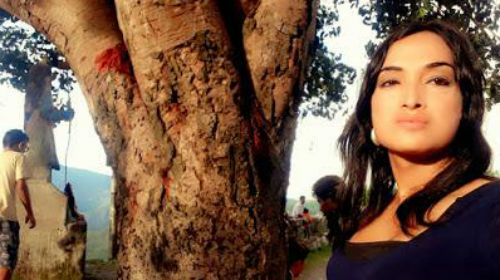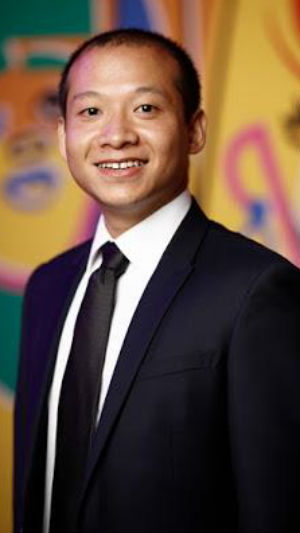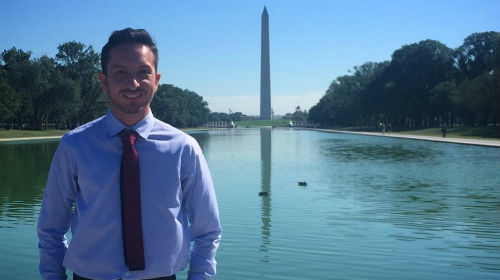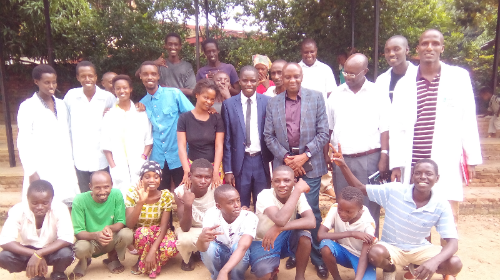HRC Observes World AIDS Day With Our Global Innovators and Fellows

Today, December 1, HRC commemorates the 30th observance of World AIDS Day. Each year, millions around the world remember those we’ve lost to HIV and AIDS and recommit ourselves to ending the epidemic.
According to UNAIDS, there were approximately 1.8 million individuals newly diagnosed with HIV globally in 2016. In an update to its 90-90-90 goals for 2020, UNAIDS reported that only 70 percent of people living with HIV globally have been diagnosed as of 2016. These statistics highlight the need for more accessible HIV programs and services, particularly in developing countries with limited medical resources.
“On World AIDS Day, we pause to remember those we have lost to AIDS-related illness, and recommit ourselves to ending the HIV epidemic and combating HIV-related stigma,” said Peter Cruz, Associate Director of the HIV and Health Equity Program. “We must keep fighting back against the continued attacks by Donald Trump and Republican leadership on the Affordable Care Act and critical HIV and AIDS programs. Today and every day, HRC stands united against attempts to roll back our progress and believes we must do everything in our power to accelerate the pace of progress toward an AIDS-free generation.”
To mark World AIDS Day, HRC recognizes a few of our Global Innovators and Global Fellows who are working tirelessly on behalf of individuals living with and affected by HIV in their countries.
Manisha Dhakal, Blue Diamond Society, Nepal (HRC Global Innovator)

“HIV and AIDS service interruption because of funding gaps was the biggest challenge that we face. Because of these gaps, it is difficult to access condoms, lubricants, and testing services for gay men and transgender people.”
My Call-to-Action:
“There should be an enabling environment that helps people access services. Enabling environment means sensitizing service providers and supporting legal provisions for the most at-risk populations so that they can access those services easily. Let’s work together to end discrimination and stigma to create an enabling environment with a rights-based approach.”
Ryan Law, Zhitong Guangzhou LGBT Center, China (HRC Global Fellow)

“People living with HIV and AIDS are still facing huge stigma and big challenges in terms of getting medical care and equal worker’s rights. We have been doing a lot of work to tackle this issue, like HIV prevention outreach education within the community, working with hospitals to offer better testing services and non-discriminatory and professional treatment to individuals living HIV and AIDS, and building a platform for people living with HIV to come together and support themselves. We are making progress. Earlier this year, we won the first case ever forbidding workplace discrimination against people living with HIV and AIDS.”
My Call-to-Action:
“I think we should push for access to PrEP, because it is an effective way to stop new infections. Unfortunately, we don’t have it [in China]. One of the biggest reasons new infection rates are going up is because we lack proper sex education; if you don’t talk about sex, then you can not talk about sexual health, and that leads to unhealthy behavior. That is why we need to push our educational system to have better sexuality education.”
Diego Leo Mora, HIV en los medios, Colombia (HRC Global Fellow)

“The biggest challenge facing people with HIV and AIDS in Latin America is the stigma and discrimination that they are exposed to due to ignorance of the epidemic. Unfortunately in this region, people are not very proactive when researching HIV and prefer to have actions that are a consequence of what is heard from voice to voice, which implies a lot of barriers that affect the quality of life of people living with the virus, including access to health services, work, education and the treatment of society in general.”
My Call-to-Action:
“We must be multipliers and generators of new HIV information, where we can encourage the use of good language and good practices to end the stigma and discrimination against people living with HIV and AIDS. It is necessary to ally with different stakeholders in society. We are all political agents and from our own homes and friends we can begin to improve the quality of life of people living with HIV and AIDS.”
Alexis Nizigiyimana, Village Health Action, Burundi

“My entire work is focusing on advocacy and HIV prevention and management among key populations (people who inject drugs, sex workers and LGBT) through Village Health Action that I founded in Burundi. Through my work, I realized that there is an increased prevalence of HIV and Hepatitis B & C. The main challenges are criminalization of the LGBT community in Burundi, impeding them from accessing health care services. Most importantly, a law which forbids the provision of opioid substance therapy and needle syringe exchange programs for people who inject drugs led to an increase in HIV and Hepatitis B & C transmission.”
My Call-to-Action:
“Advocate at the local and global level for improved access to health care as a human right for key populations. Also, increasing financial support to organizations that provide health care services and advocacy to these populations. Lastly, influence policy makers to abolish these discriminatory laws.”
Read more information about HRC’s HIV and Global programs.
You Might Like
